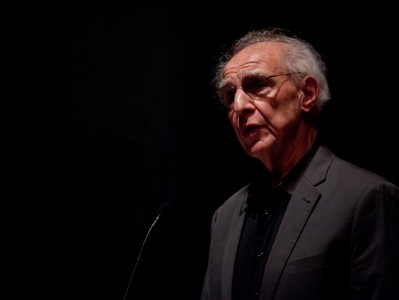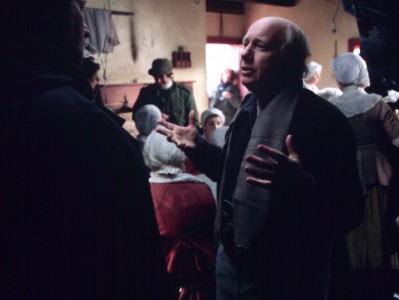
To trace Alfred Guzzetti’s career in film and video is to follow a trail through the intersections of motion picture media and form. Just as other, early interests—including still photography, music composition and English literature—fold elegantly into the structure of his moving image work, his films and videos likewise encompass a diversity of forms while always seeking a rigorous understanding of the specificity of those particular forms. He operates dexterously among avant-garde film, video and installation, as well as a variety of documentary genres: autobiographical, ethnographic, and film essay. In addition to many years teaching film at Harvard, he is also the author of numerous essays on film, as well as the innovative investigation Two or Three Things I Know about Her: Analysis of a Film By Godard (Cambridge: Harvard University Press, 1981).
In 1960s Cambridge during the awakening of the 16mm verité explosion, Guzzetti—who already had some youthful film experience—took the first film class at Harvard taught by Robert Gardner; after graduating, he began teaching a new media course at the Harvard Graduate School of Education, and has taught filmmaking in Harvard's Art, Film, and Visual Studies (formerly VES) department since 1971. He made a few short films and a double-projected documentary, Notes on the Harvard Strike (1969). This led to his first significant film, Air, a dense “film opera” that was heavily influenced by both his musical background and his frequent trips to MIT’s Film Society, a screening series that featured the films of complex sound-and-image composers like Peter Kubelka and Bruce Baillie.
Having been exposed to a range of personal and ethnographic documentary by the early 70s, Guzzetti sought to pursue his own path using a subject he knew well by expanding backwards in time and deeper into the present. The result was Family Portrait Sittings, which opens an autobiographical door onto the vast landscape connecting his family to the history of immigration in America. He continued making personal ethnographies and then joined filmmaker Richard P. Rogers and photographer Susan Meiselas on his first works abroad, Living at Risk: The Story of a Nicaraguan Family (1985) and Pictures from a Revolution (1991), which covered the Nicaraguan revolution from alternative points of view. He also collaborated with Ákos Östör and Lina Fruzzetti on the ethnographies Seed and Earth (1994) and Khalfan and Zanzibar (1999), depicting life in rural Bengal and Zanzibar, respectively.
Impressed with the audio quality of video as opposed to 16mm film’s mono soundtrack, Guzzetti also began creating poetic, short video works in the early 90s, meant for gallery display. Working with audio and visual montage in addition to scrolling text—often detailing his own dream narratives—Guzzetti again imparts a musical sense of composition and rhythm, drifting in and out of dream, memory, mediated reality and a never-existent present. Whether at home, in a foreign land or in an unlocatable mental space, Guzzetti questions perception and representation while deeply observing the mysterious forces that shape existence. His rhythmic approach translated well to his many collaborations with composers via multi-screen installations or video pieces made for live orchestral performances.
Scott MacDonald compares Guzzetti’s editing technique to Nathaniel Dorsky’s “polyvalent montage,” wherein “each shot subtly refers backward and forward, each cut reveals both change and continuity within a complex, evolving montage structure.” Perhaps also relevant is the musical concept of counterpoint, in which independent musical lines harmonize and melodically interact. Guzzetti’s montages are of parallel modern realities—the connected and the alienated, the everyday and the exotic, nature and city, motion and stillness, the mirror and what it reflects, the film and what it represents—and their occasional, revelatory points of intersection. – Brittany Gravely
ABOUT THE COLLECTION
The Alfred Guzzetti Collection was donated to the HFA by the artist in 2019 and consists of film, video and digital material for over fifty works he created between 1964-2020, including screening materials as well as picture and sound negatives, intermediate copies and outtakes. Additionally, a series of notebooks document the development of specific projects, and film, manuscript, and digital materials documenting Guzzetti's tenure as a film production professor are included.
The collection is currently unprocessed and all research inquiries should be directed to collections staff.
Alfred Guzzetti and his family manage the copyright to this material, please contact them directly regarding any public screening or re-use inquiries.
For more information, visit Alfred Guzzetti's website.












